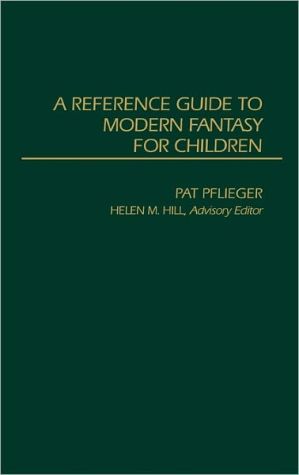

 |

|

The average rating for A Reference Guide to Modern Fantasy for Children based on 2 reviews is 4 stars.
Review # 1 was written on 2019-05-29 00:00:00 Charles Casey Charles CaseyHuge project that I had to cut down; many index cards that had to be constantly alphabetized; three three-ring binders that had to be constantly updated; a solid month of 11-hour days of typing the final manuscript (many soap operas watched while I typed); an entire afternoon spent photocopying the manuscript (and outrage from the manager at the copy place, because my photocopying was one reason the electrical circuit got overloaded or something, and the electricity went off); much despair over the Introduction ... Ah, the days before personal computers and before I finished my PhD and could tell everyone else to shove off. Fun to read all those works of fantasy fiction; not always so much fun to try to sound erudite while writing about them ( Miss Hickory was a particular challenge. Okay, so was The Owl Service , but for a different reason). Excellent editing by Greenwood Press. This was a nice introduction to academic publishing. Especially when the American Library Association listed it among their 50 best reference books the year it was published. And I actually made some money! |
Review # 2 was written on 2015-11-20 00:00:00 Ulrich Niem�ller Ulrich Niem�llerNow comes the point at which I feel guilty marking this as 'read' when, in reality, I read the Introduction and Chapter 1 and then skimmed the rest for any mentions of my essay topic. But, aside from that, Woolf's study looks at the afterlife of historical texts in Early Modern England given the advent of printing in the period. The chapter I looked at focused specifically on the decline of the rise and fall of the chronicle and its dissolution into what Woolf chooses to call "parasitic genres" (almanacs, diaries, newsbooks and chronicle plays to name but a few) which, he argues, encompassed the original functions of the chronicle history. Given my interest in the "history play" of the Elizabethan era, and trying to pin down some reasoning for its popularity in the 1590s, this insight was a particularly useful addition to my own line of argument - precisely what I was hoping to mine this book for. The subsequent chapters I am reliably informed by the contents page include discussions on the purposes of reading history, the ownership of historical works, borrowing and lending of historical works, and how history was marketed. A quick peek at some appendixes reveals extensive charts on the pricing of various volumes so this study is, I'm sure, nothing if not detailed. All in all, the 80 some pages of this book I read were thankfully very readable and approachable and served their purposes well in providing me with some much needed context regarding the place of the chronicle in Elizabethan society. |
CAN'T FIND WHAT YOU'RE LOOKING FOR? CLICK HERE!!!